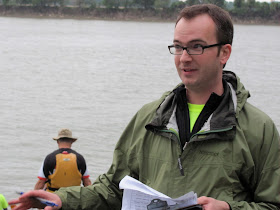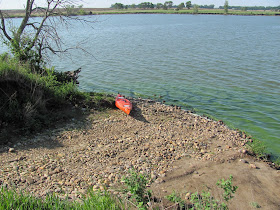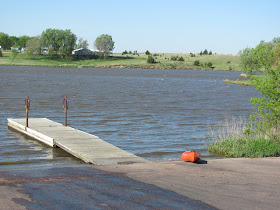The 2012 South Dakota Kayak Challenge got underway this
morning at 7:00 a.m. with 158 kayaks and canoes departing from Riverside Park
in Yankton bound for Sioux City, Iowa, 72 miles downstream on a free-flowing
natural section of the Missouri River.
The Challenge began and continues as a project managed by
Jarett Bies and Steven Dahlmeier in association with a number of companies and
agencies, the South Dakota Kayak and Canoe Association among them. The first
race took place in 2010 with 90 kayaks and canoes participating. There was a second race planned for
2011, but it had to be canceled because of the heavy flow of water through the
dam system as floods advanced along the Missouri River.
This second edition of the Challenge got underway this
morning with a 50 percent increase in participation over 2010. The day began at Riverside Park in
Yankton with a stiff head wind, grey overcast skies, and a chill in the
air. People were wearing jackets
as they got their equipment in place
 |
| Pat Wellner - "Pirates of the Missouri" Blog: http://www.piratesofthemissouri.com/ |
Boats were stacked in three ranks along the riverbank as
they prepared for a send-off by the Yankton VFW color guard with their rifles
as starting guns. Steven Dahlmeier
served as the Beach Master getting boats entered on his check list, Cory
Diedrich, the Check Point Boss, organized his large corps of volunteers who
manned the check points and assisted in a variety of organizational and
logistical tasks, and Jarett Bies officially started the race.
 |
| Jarett Bies Starting the Race |
 |
| Steven Dahleier Explaining the Procedures |
 |
| Cory Diedrich - Check Point Boss |
There was a great variety of boats entered in the race, including sleek surf skies, long fast kayaks, tandem canoes and kayaks, a stand-up surf ski, and single kayaks of many shapes and lengths.
There were several classes into which the racers could enter
their craft. Paddlers came from a
number of states, some as far away as North Carolina and Texas. Some of the paddlers were highly
competitive, and their boats were sleek and fast; a few others were novice
paddlers and some were even in nine-foot recreational boats. At Check Point 1, there was a
spread of almost four hours between the first boats through and the last ones
to arrive.
Within just a few minutes, the armada of boats had cleared
the park area and fanned out across the water. The first of four check-points was Myron Grove, just over
18.4 miles downstream on the South Dakota side.
The first boat across Check Point 1 was a single kayak that
made the trip in just over two hours. The experienced and competitive racers
did not stop at the first check-point and instead just confirmed their assigned
number and continued downstream toward the second check-point, 12.1 miles
further down on the Nebraska side.
Other paddlers stopped for a breather or a refill on their
water. Some rested for a while
before continuing. By this first
check-point, however, thirteen paddlers had decided to drop out of the race.
My volunteer role this year was to assist at the send-off
where needed and then to serve as one of the officials at Check Point 1. A team of us recorded the numbers and
times for paddlers as they passed through.
By noon, the day had improved markedly; the sun was out,
jackets were flung off, and the wind seemed to subside, at least in the shelter
of the check-point.
The major purpose of the Challenge is for paddlers to
stretch themselves on the big waters of the Missouri River. The challenge is to test one’s self in
the face of a large river with a variety of wind and current conditions. Most of the paddlers have no intention to
win the race; they are just out on the water having fun with a large group of
people with the same goals. There
are, however, some paddlers for whom the race is a personal challenge with a
strong sense of competition involved.
That is why, of course, there are several classes within the Challenge.
This is the greatest paddling event that we have in South
Dakota, and it rivals other endurance river races in neighboring states. The success of this effort is directly
linked to the strong leadership corps that made it all possible. It is a great collaboration of many
agencies within the state working together to further the sport of paddling.
As I looked at the paddlers getting ready to set off into
the teeth of that SE head wind and the grey skies, I was glad to be a volunteer
rather than a racer. After all, I
am an old man, and hopefully I realize my limitations. By the time I watched the boats pass at
Myron Grove, though, I wished that I were moving along with the pack. Maybe another time, I will go on the
first stage – just do the 18.4 miles in a respectable time and enjoy that sense
of accomplishment and inclusion. Maybe I can say that I just want to go along
and get some on-water photographs.
Or, maybe I will just let that enthusiasm pass and serve as a volunteer
check-point official again.
Details of the race can be found on the following sites:
My complete set of photographs from Riverside Park through
the Myron Grove Check Point can be seen at:

















































